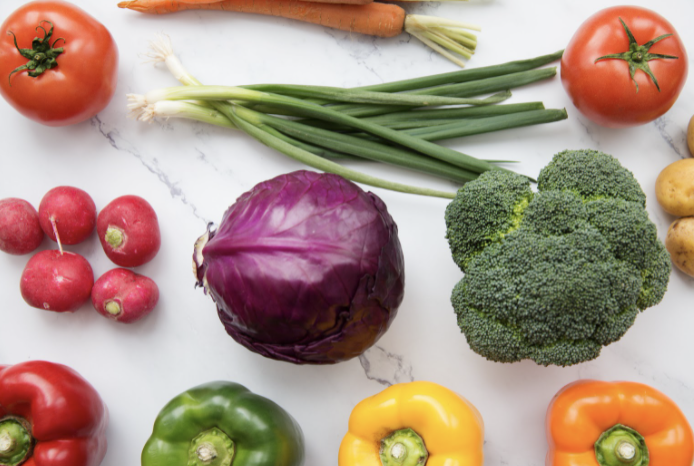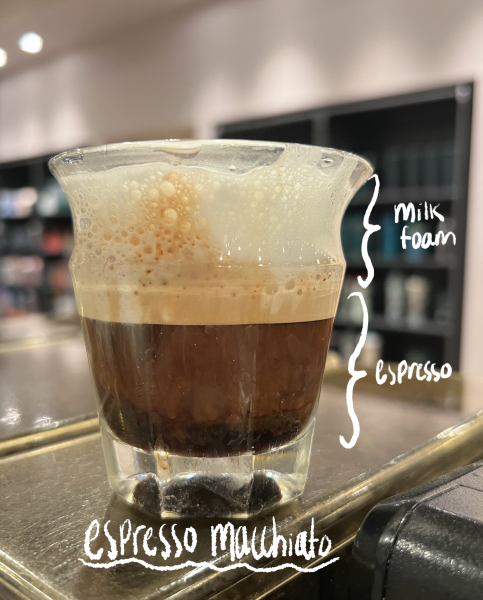Stress Less: Eat for Success
March 24, 2022
AP’s. Regents. Finals: Testing season is right around the corner. And while we must find time to prepare for those exams, we also still have our weekly homework, projects, classroom tests, sports practice, and club meetings.
Fourth quarter often means putting sleep, exercise, and self-care on the back burner. Our cortisol (stress hormone) levels are rising, with the purpose of kickstarting our fight-or-flight response in order to give us the energy to respond to a short-term stressful situation. This also leads to inflammation, the process of our immune system recognizing harmful agents and sending pro-inflammatory cytokines that trap them. If we stay stressed and are in our fight-or-flight mode for too long, the inflammation becomes chronic, adversely increasing our cortisol levels further. Thus, our immune system weakens as cortisol suppresses nonessential functions, like sending immune cells to kill a cold virus or infections.
“The best way to lower cortisol in the body is to focus on an anti-inflammatory diet,” explains registered dietician Courtney Barth in a Cleveland Clinic article. Thankfully, many foods can help us decrease inflammation while simultaneously decreasing our cortisol levels. Before we explore the relationship between nutrition and stress, here are a few important definitions:
- Antioxidants: Molecules that protect cells against the effects of free radicals.
- Free radicals: Atoms that damage cells. They’re produced when your body breaks down food, or when you’re exposed to tobacco smoke.
- Macronutrients: Essential nutrients (protein, carbohydrates, fats) that provide energy.
- Micronutrients: Essential vitamins and minerals that our bodies cannot produce and must be derived from our diet.
- Phytonutrients: Compounds produced by plants that have beneficial effects on our health.
Fats
Specifically, omega 3 fatty acids, the good polyunsaturated fats that we learn about in biology. It is important to consume omega-3 fats because the body is unable to make this essential fatty acid, and they are associated with lowering inflammation and cortisol levels. The three main omega-3 fatty acids are ALA, EPA, and DHA. EPA and DHA are commonly found in seafood, like salmon, tuna, mackerel, etc; dietary guidelines recommend consuming seafood at least twice a week. ALA is found in plant based foods, like chia seeds, hemp seeds, flaxseeds, and walnuts. Enjoy a spoonful of seeds or a handful of nuts in a meal daily.
- Try making a 3-ingredient chia seed pudding for breakfast.
- Crush a handful of walnuts on top of your oatmeal or yogurt.
- Sprinkle hemp seeds on top of salads and stir fries. (You won’t taste it, I promise!)
Fiber-Rich Carbohydrates
Carbs are not the enemy. When we don’t eat enough carbohydrates, we get low blood sugar levels because our bodies aren’t getting enough energy to function. This will increase our stress levels, as our anxiety and nervousness become less stable. Moreover, carbohydrates help tryptophan reach our brain, where it then helps to produce serotonin (the hormone that helps us feel good) and melatonin (the hormone that promotes a restful sleep). Everyday stress can feel twice as bad when we don’t get enough sleep, so utilize fiber-rich complex carbohydrates to stabilize your cortisol levels.
- Make a veggie-packed tomato sauce to use when cooking eggs, pasta, chili, or lasagna.
- Try this refreshing 7 ingredient black bean salsa.
- When you’re buying bread, look for whole wheat on the ingredient list. When you eat white bread, the lack of fiber contributes to blood sugar levels rising and then crashing, making us tired. Whole grains can give us long-term sustained energy.
Magnesium
Magnesium helps lower our cortisol levels, but when we’re stressed, magnesium loss increases through the kidneys. This leads to a vicious cycle where stress causes a magnesium deficiency, and magnesium deficiency intensifies the body’s susceptibility to stress. Signs like feeling anxious, nervous, or weak, can all be due to a mild deficiency in magnesium. The good thing is that studies show an inverse relationship between cortisol and magnesium levels, so incorporating more magnesium-rich foods in our diet can reduce cortisol.
- Eat a square or two of 70% or higher dark chocolate at night.
- Add a handful of spinach when you’re making soup, salad, or a smoothie.
- Try this 5 ingredient chocolate avocado pudding or a simple mayo-free avocado egg salad.
Vitamin D
Vitamin D is also known as the “sunshine” vitamin because when our skin is exposed to the sun, vitamin D synthesis is triggered. Getting enough vitamin D has been associated with sleeping better, which always puts us in a better mood. In addition, vitamin D encourages serotonin production, which in turn elevates our confidence and self-esteem.
- The sun will be your best source of vitamin D, so try to stand in the sun while you’re waiting for the bus, or walk home along a path with more sunlight. Especially since these 5-10 minutes of sun exposure most likely aren’t happening between 10 am and 4 pm, it is a safe amount of time in the sun.
- Baked salmon is the perfect weeknight dinner: it’s easy, delicious, and only takes 5 minutes to prepare.
- The egg yolk not only contains vitamin D, but also vitamin A, E, and K, so eat the whole egg!
Anthocyanins
Anthocyanins are part of the flavonoid group of phytonutrients, giving fruits and vegetables their deep red or blue color. Known for their anti-inflammatory effects, they also boost our immune system because they are rich in antioxidants, which protect our cells from free radicals.
- Try roasting red cabbage to make them nice and crispy.
- These frozen yogurt covered blueberry bites are a simple study snack to make at the beginning of a week.
- This 3 ingredient cranberry pistachio dark chocolate bark only takes 10 minutes to make.
Simply put, focusing on whole foods will provide the necessary nutrients that will decrease inflammation and cortisol levels. Of course, exercising and sleeping are also crucial, but at times we can only devote enough energy to one aspect of our health. Even when there are days or weeks that feel extremely stressful, nourishing yourself with healthy and energy-boosting foods is a way to continue practicing self-care.
















